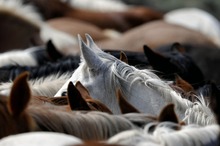The U.S. Senate Appropriations Committee voted in favor of a provision that, if enacted into law, could halt any efforts to resume slaughtering horses for human consumption on U.S. soil.

Halting efforts to resume slaughter of horses
U.S. Senate Appropriations Committee voted in favor of a provision that, if enacted into law, could halt any efforts to resume slaughtering horses for human consumption.
© 2012 by Carien Schippers
The amendment to the agriculture appropriations bill, which was offered by Sens. Mary Landrieu, D-La., and Lindsay Graham, R-S.C., and approved by the committee by voice vote, disallows spending by the U.S. Department of Agriculture on inspections at prospective horse slaughter plants in FY 2014, effectively preventing any from opening. An identical amendment was passed by the House Appropriations Committee last week.
A similar spending prohibition that was put in place in 2005 was not renewed in 2011, allowing for horse slaughter plants to reopen in the U.S. There are no horse slaughter facilities currently operating in the U.S., but USDA confirms it had received at least six applications from prospective abattoirs, and several are close to being approved.
Wayne Pacelle, president and CEO of The Humane Society of the United States, issued the following response:
“The idea of slaughtering horses for human consumption will never gain traction here—Americans’ abiding appreciation for horses, and our debt to these animals for their service, will triumph over the idea of making a profit on these animals by the pound. The House and Senate appropriations committees have spoken, and we look forward to seeing this spending prohibition on horse slaughter inspections adopted into law.”
Background:
- President Obama’s proposed FY 2014 budget included a request for Congress to prevent tax dollars from supporting horse slaughter.
- Currently, there are no horse slaughter facilities operating in the U.S., but USDA confirms it had received at least six applications from prospective abattoirs, and several are close to being approved.
- American horses are raised to be companions, athletes and work horses. They are often treated with drugs, both legal and illegal, that can endanger the food supply. There is currently no system in the U.S. to track medications and veterinary treatments given to horses throughout their lives to ensure that their meat is safe for human consumption.
- “Kill buyers” gather up horses from random sources and profit by selling horsemeat from healthy horses that bring the best price per pound for their meat. USDA reports show that approximately 92 percent of American horses going to slaughter are healthy and would otherwise be able to go on to lead productive lives.
- The methods used to kill horses rarely result in quick, painless deaths, as horses often endure repeated blows to make them unconscious and are sometimes remain conscious during the slaughtering process.
When horse slaughter plants previously operated in the U.S., the USDA documented severe injuries to horses, including broken bones and eyeballs hanging from a thread of skin.
The Safeguard American Food Exports Act, H.R. 1094 / S. 541, introduced this year by U.S. Sens. Mary Landrieu, D-La., and Lindsey Graham, R-S.C., and Reps. Patrick Meehan, R-Pa., and Jan Schakowsky, D-Ill., is a bipartisan measure that would outlaw horse slaughter operations in the U.S., end the current export of American horses for slaughter abroad, and protect the public from consuming toxic horse meat.
